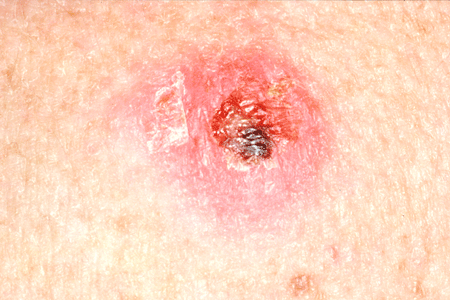
Posted on: Wednesday, 1 December 2010, 08:18 CST
(Ivanhoe Newswire) — Nonmelanoma skin cancers are some of the most commonly diagnosed in the U.S. A new study found a possible preventative treatment in the nonsteroidal, anti-inflammatory drug Celecoxib.
Celecoxib is typically used to inhibit the enzyme cyclooxygenase 2, which has been associated with the onset of UV ray-caused nonmelanoma skin cancers. Since sunscreen has only shown mediocre results in protecting reducing these cancers, researchers at the University of Alabama at Birmingham looked at Celecoxib as an additional preventative measure by testing it on patients with precancerous symptoms.
Lead researcher Craig A. Elmets, M.D. and his associates created a randomized, double-blind trial in which 240 participants with actinic keratoses or precancerous lesions were given either Celecoxib or a placebo. Results were gathered first during the third, sixth and ninth months of therapy, and then two months after the therapy was completed.
The results showed that the Celecoxib group and the placebo group yielded the same number of precancerous lesions. by the end of the study, however, the participants in the former group had developed less non-melanoma skin cancers than those in the latter group.
"The findings in the study, which showed that the celecoxib-treated individuals developed fewer nonmelanoma skin cancers than placebo-treated individuals, suggest that cyclooxygenase inhibitors may provide an additional benefit to sunscreens in the prevention of nonmelanoma skin cancers," the researchers wrote.
The FDA shut the study down after a similar study of another cyclooxygenase 2 inhibitor found that the treatment increased the risk of adverse cardiovascular events. such events were not found in the University of Alabama study, but the researchers believe that the nine month treatment period could have been too short for them to occur. for example, another cyclooxygenase inhibitor called rofecoxib showed adverse events after a one year trial.
University of California, Irvine editorialists Frank L. Meyskens Jr. M.D. and Christine E. McLaren M.D. recommend that future researchers lower either the dosage or frequency of Celecoxib administration to lessen the adverse cardiovascular events. They point out that efficacy of Celoxib in reducing the likelihood of nonmelonoma skin cancers, and its failure to reduce the number of precancerous legions, could indicate a difference in the pathways of carcinogens between early and late-stage tumor growth.
SOURCE: Journal of the National Cancer Institute, November 2010
Source: Ivanhoe Newswire
More News in this Category